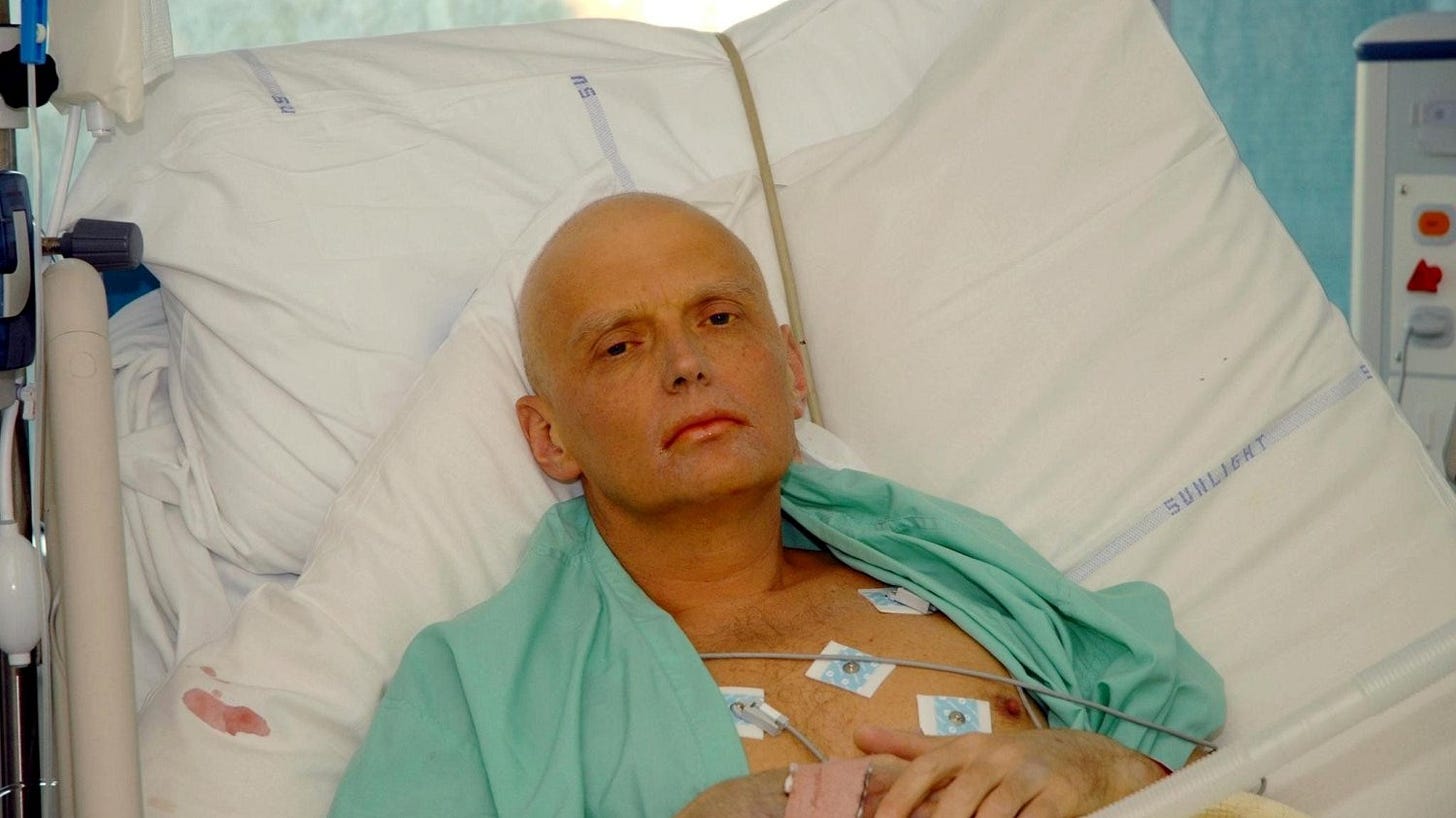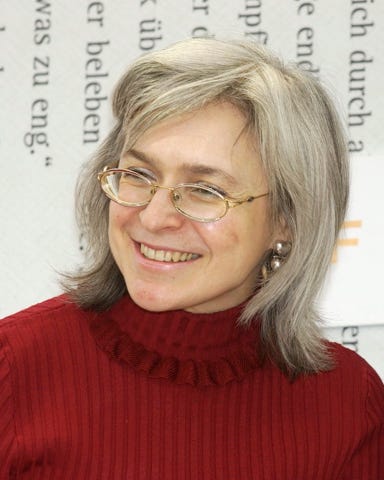How Putin's regime kills its opponents
Brief list of key info about first 10 years of Putin's regime assassinations
Alexander Litvinenko’s poisoning
Evidence of State Involvement: The document establishes a strong circumstantial case that the Russian State, under the leadership of President Vladimir Putin, was responsible for Litvinenko's death. Litvinenko himself accused Putin of being behind his poisoning in a deathbed statement.
Approval and Oversight: Witnesses and experts testified that such a high-profile operation, involving the use of polonium-210 (a rare and tightly controlled substance), could not have been executed without the knowledge and approval of the highest levels of Russian leadership, including President Putin. This is based on the structure and traditions of Russian state governance, where significant actions, especially those involving foreign operations or sensitive materials, require top-level sanction.
Public and Political Support for the Perpetrators: After the assassination, Andrey Lugovoy, one of the main suspects, was celebrated in Russia, becoming a member of the Duma and receiving a state honor from Putin himself. This act was interpreted as a clear signal of support for Lugovoy and, implicitly, approval of the assassination.
Context and Motive: Litvinenko was a vocal critic of Putin, accusing him and the FSB (Federal Security Service) of various illegal activities. The document highlights that Litvinenko's assassination fits a pattern of actions against individuals who posed a threat to Putin's administration.
Conclusion of Responsibility: The inquiry concluded that the operation to kill Litvinenko was likely approved by Nikolai Patrushev, the head of the FSB at the time, and President Vladimir Putin. This conclusion is based on the nature of the operation, the substance used, and the political context, underscoring the involvement of the highest levels of Russian state authority.
Public and Private Reactions: The Russian government's lack of cooperation with the investigation, refusal to extradite the main suspects, and the subsequent honors bestowed upon Lugovoy by Putin, all contribute to the conclusion of state responsibility and Putin's personal approval or at least his post-facto endorsement of the operation.
Anna Politkovskaya killing:
Assassination Date: Anna Politkovskaya was murdered on October 7, 2006, which coincides with Vladimir Putin's birthday, suggesting a symbolic message or connection to the Russian President.
Criticism of Putin: Politkovskaya was known for her critical coverage of Putin’s policies, especially the Chechen conflict, and her book "Putin's Russia" accused his government of stifling democracy and human rights.
Pre-Assassination Threats: Politkovskaya received numerous threats linked to her investigative reporting on Russian state actions in Chechnya and her outspoken criticism of Putin.
Poisoning Attempt: In September 2004, Politkovskaya fell violently ill in a suspected poisoning attempt after drinking tea, indicating prior attempts against her life linked to her work.
Warnings from Litvinenko: Alexander Litvinenko, a former Russian FSB agent, warned Politkovskaya about the danger to her life from Russian state actors before his own assassination in London in November 2006.
Putin’s Comments Post-Assassination: After her death, Putin dismissed Politkovskaya’s impact on political life in Russia, which critics argue minimizes the significance of her work and her murder.
Investigation and Trials: Despite multiple trials, the masterminds behind the assassination remain unidentified, raising concerns about the thoroughness and integrity of the investigation under Russian jurisdiction.
Link to Russian Security Services: Several suspects in the murder were connected to the Russian Federal Security Service (FSB), suggesting potential state involvement or complicity in the crime.
International Condemnation: The murder drew international condemnation and highlighted concerns over freedom of the press in Russia, with demands for an independent investigation into the killing.
Pattern of Silencing Critics: Politkovskaya’s assassination is part of a broader pattern of attacks on journalists and critics of the Kremlin, underscoring the dangerous climate for free speech in Putin’s Russia and raising suspicions about state-sanctioned violence to silence dissent.
List of Chechen leaders assassinations during the first 10 years of Putin’s era
May 2000: Ruslan Alikhadzhyev, a Chechen separatist politician and former speaker of the Chechen parliament, was abducted from his home in Shali by Russian forces and subsequently killed. His body was never found.
March 19, 2002: Amir Khattab, also known as Samir Saleh Abdullah Al-Suwailem, a key figure in the Chechen insurgency and a foreign mujahideen commander, was killed by a poisoned letter delivered by a Dagestani double agent working for the FSB.
February 13, 2004: Zelimkhan Yandarbiyev, former acting President of the Chechen Republic of Ichkeria, was assassinated in Doha, Qatar. His death marked a significant international incident, with Qatar convicting two Russian SVR agents, underscoring Russia's reach in targeting Chechen dissidents abroad.
July 9, 2004: Paul Klebnikov, an American journalist and the editor of Forbes Russia, was murdered in Moscow. He was investigating corruption and the lives of Russia's richest people, including their connections to Chechnya, which made him numerous enemies.
October 7, 2006: Anna Politkovskaya, a journalist known for her critical coverage of the Chechen war and human rights abuses, was shot dead in her apartment building in Moscow, an act widely seen as a targeted killing for her investigative reporting.
November 18, 2006: Movladi Baisarov, a former FSB officer and Chechen warlord, known for his rivalry with Chechen President Ramzan Kadyrov, was shot dead in central Moscow by members of the Chechen security forces in a public execution-style killing.
September 24, 2008: Ruslan Yamadayev, a former member of the Russian State Duma and opponent of Chechen President Ramzan Kadyrov, was assassinated in Moscow, signaling the dangerous politicization of Chechen leadership disputes.
January 13, 2009: Umar Israilov, a former bodyguard to Chechen President Ramzan Kadyrov who had sought asylum in Austria and filed a complaint against Kadyrov for torture and abductions, was murdered in Vienna, indicating the global scale of the Chechen conflict.
March 30, 2009: Sulim Yamadayev, a former commander of the Vostok battalion under GRU and a prominent figure in Chechen politics, was shot in Dubai. His assassination pointed to the violent power struggles within Chechen and Russian political echelons.
Polish President Lech Kaczyński 10 IV 2010
Here is the English version of the report
The Tu-154M overhaul was "controlled by Russian special services," highlighting Oleg Deripaska's connections to Putin and indicating an enforced decision by Russian authorities.
Faulty parts replacement was evident, including "explosive traces found in wing slots," underscoring compromised aircraft safety and oversight failures.
The decision for the overhaul, influenced by "Polish officials connected to communist services," was approved by Prime Minister Donald Tusk, reflecting internal political influences and oversight.
Actions complicating the President of Poland's visit to Smolensk included "agreeing to separate visits demanded by Putin," revealing the political pressures and decisions shaping the event.
The preparation for the visit was "entrusted to individuals with Soviet intelligence backgrounds," indicating a disregard for security and proper vetting.
The administration "disregarded terrorist threat warnings for flights from EU to Russia," highlighting a critical oversight and failure to prioritize safety.
Two explosions, "identified by the presence of hexogen, pentrite, and TNT," were determined as the crash's cause, pointing to deliberate acts rather than accidental circumstances.
Immediate handing of the investigation to Putin's services by Tusk, "ignoring joint investigation proposals," suggests a lack of transparency and possible collusion.
Evidence seizure by Russia and efforts to "falsify records and control narrative" demonstrate a manipulation of the investigation's outcome.









Of course one should probably also add those who died in the Russian Apartment Bombings in 1999 which have been attributed to then Prime Minister Putin, who blamed Chechen terrorists (despite a complete lack of evidence to support his claim) for the attacks used to justify the Second Chechen War ... killing people appears to be a favourite pass-time of Vladimir, Vladimirovich. WTF would anyone negotiate with this creature and expect it to be in good faith???
Unfortunately, If Trump gets back in office he expects he will win his full immunity claim where he can do anything he wants and not be held accountable for his actions while he is president. Putin doesn't even get to that extreme. At least Putin tries to hide his actions a bit.. The U.S. is really turning into a wild card in regards to world order.
Putin said that he would rather deal with Biden than Trump because Biden is more predictable. Now that is REALLY saying something. Good Luck to us all ! We are going to need it...